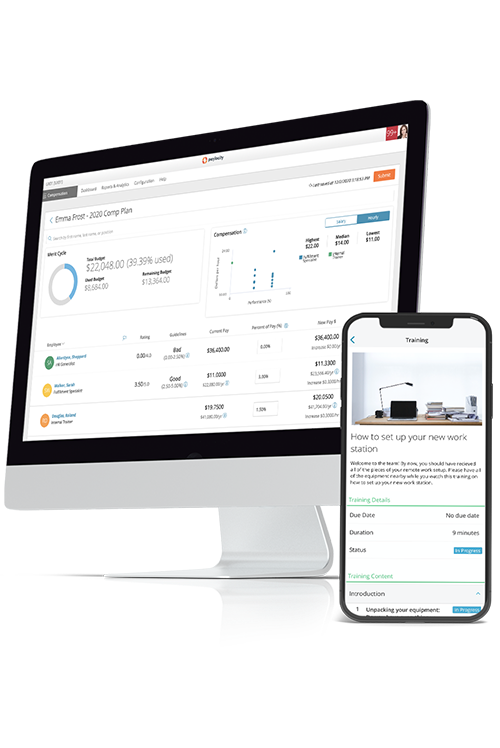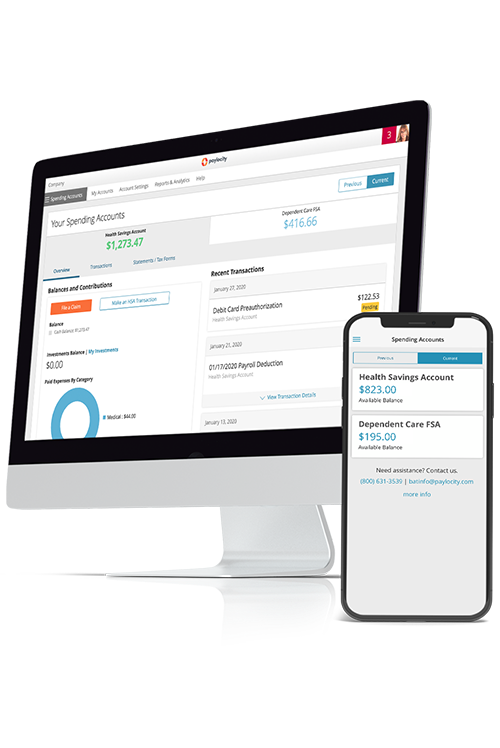resources
Employee Wellness Programs: Put Your People First
July 21, 2023
Offering a comprehensive employee wellness program that takes advantage of new technology shows your people you care about them.
Blog Post

Are employee wellness programs just an HR trend? Or are they a key to business success?
The truth is this: empowering your employees to be their healthiest, happiest, and most satisfied selves is the cultural pillar of any successful company. An employee wellness program aims to provide employees with the resources they need to thrive both in and outside of the workplace.
It doesn’t matter if your employees are in-office, fully remote, hybrid, or deskless. Prioritizing and personalizing your workforce’s health and well-being is essential if you want to maintain peak employee morale, collaboration, productivity, and retention.
So, what are employee wellness programs, and how do you create one?
What are Employee Wellness Programs?
An employee wellness program is a set of initiatives designed by your company to help employees maintain healthy lifestyles. Modern wellness programs for employees take on a holistic approach, promoting not just physical health but emotional, mental, social, occupational, and financial health as well.
For this reason, workplace wellness programs have a collection of different options that promote holistic health. Fitness classes, smoking cessation, free healthy food, and mental health apps are just a handful of the vast benefits you can implement into your program.
If you want to place employee well-being at the core of your people strategy, you need comprehensive health and wellness programs in place. They align employee values with business goals, enabling you to deliver genuine, rewarding experiences that nurture high-quality candidates into loyal, healthy, and thriving employees.
What are the Benefits of Employee Wellness Programs?
A healthier workforce is a happier workforce. And a happier workforce will be motivated to succeed. Before we explore how to create an employee wellness program, let’s discuss why you need one.
Healthier staff
Office life — traditional and remote — is sedentary by nature. Even deskless jobs are becoming less physical, thanks to automation technologies. This can lead employees to pick up bad habits, like sitting down or staring at a screen all day, putting them at increased risk of diseases and complications that reduce productivity and engagement.
Promoting exercise and healthy nutrition helps prevent physical disease and ill health. But it doesn’t stop there. Empowering employees to smoke less, drink less alcohol, and get eight hours of sleep positively impacts health on emotional, mental, and social levels, leading to a more energized, healthy, and happy workforce.
Improved mental health and reduced stress
Our physical and mental health are intricately entwined. So much so there’s an abundance of research proving the more physically healthy you are, the more mentally healthy you tend to be.
By encouraging employees to be more physically healthy with exercise and eating better, you can indirectly improve their mental well-being. But the reality is good nutrition and exercise aren’t always enough for those who are struggling.
Luckily, employer-sponsored wellness programs can target mental health and stress directly. Free therapy. Mindfulness programs. Stress-reduction workshops. Guided meditation. There’s a range of activities you can implement to help employees alleviate and manage symptoms of stress, depression, and anxiety.
Greater teamwork
Team-building activities are a common feature of corporate wellness programs. Regardless of whether they take place in person or over video chat, team-building activities like group exercise classes, games, and quizzes can strengthen coworker relationships.
Employees who are comfortable with each other are better collaborators. They share ideas more confidently, can problem-solve more efficiently, and are able to resolve conflict with minimal productivity loss.
Most importantly, this kinship instills a sense of belongingness and togetherness that improves job satisfaction, keeping high-quality employees at your company for longer.
Increased motivation and productivity
Healthier employees are more productive at work.
In a Health Enhancement Research Organization study of over 500 employers, 90% of business leaders indicated that health has a significant influence on employee productivity and performance.
Healthier employees are less likely to call in sick due to illness or burnout, and they’re more alert, enthusiastic, and motivated.
Conversely, unhealthy behaviors like persistent lack of sleep, binge drinking, and poor diet habits can trigger productivity-hindering symptoms like chronic lethargy and brain fog.
This can have a material impact on your organization. U.S. employers lose $225.8 billion each year due to productivity losses related to employee health issues.
It’s unsurprising that healthier habits like exercise and adequate sleep increase focus and energy. Ultimately, employees are more “switched on” while at work, improving productivity.
Better employee engagement
If you want to retain a productive, connected, and motivated workforce, you need to unlock the benefits of employee engagement. But how do you do it?
Employee wellness programs foster a culture of employee wellness and, as a result, drive engagement. An employee wellness culture is one that understands, listens to, and supports the needs of employees, successfully increasing their sense of connectedness.
Wellness activities like team-building exercises and peer recognition make employees feel more connected to your company. And the more connected they feel, the more motivated they’ll be to engage positively with their work.
Attract new talent
Today’s workers are putting their well-being first, and rightly so! Studies show 53% of employees are willing to prioritize their health and well-being over work. So willing, that over half are prepared to switch companies entirely.
Jobseekers look for companies that offer a variety of wellness benefits. So, investing in an employee wellness program can put you at a competitive advantage. Promote your program on your company website and in your online job ads to attract employees who are looking for this support in their employer.
How to Create the Best Employee Wellness Programs
The best employee wellness programs are highly engaging, accessible, adaptable, and tailored to your employees’ needs. The trick to ensuring your wellness program delivers these essential features is to plan, implement, and measure your program strategically.
1. Plan
The first thing you need to do is conduct employee surveys and focus groups.
Why?
Because to maximize engagement for your wellness program, your program needs to deliver value. And how do you know what your employees value unless you ask them directly?
If your employees could change anything about your workplace to improve their well-being, what would it be? Are there any aspects of their current job role that negatively affect their well-being? What rewards do they think would work best as incentives to make healthier choices?
Delve into your employees’ needs, preferences, and interests to evaluate your current weaknesses and identify opportunities. From there, design a corporate wellness plan that incorporates the benefits your employees value most.
2. Implement
Now’s the time to launch your employee wellness program — but once again, you need to keep an eye on engagement.
Communicate your wellness program across your different online and offline channels, such as social media, email newsletters, or your social collaboration hub. Ensure your programs are accessible to all of your employees regardless of their income, location, physical abilities, etc. Actively encourage and incentivize employees to get involved, making sure to communicate the benefits of doing so.
3. Measure
Measuring the achievements of employee wellness programs allows you to identify your successes and make informed improvements. To measure effectiveness, you can collect performance KPIs and correlate them to specific employee wellness activities.
For example, you can analyze the productivity and engagement levels of employees before and after implementing an employee assistance program.
Most importantly, use surveys to collect employee feedback. You can ask employees directly whether your program has had a positive effect on their well-being. Did it trigger any positive behavioral changes? Why or why not? Use these insights to improve the effectiveness of your strategy.
Employee Wellness Program Examples: What to Think About
The collection of options you include in your employee wellness program will differ depending on your employees’ specific needs. For example, there’s no point implementing a standing desk policy if all employees work remotely full-time.
Here are a few employee wellness program examples to help you get started.
Exercise classes
Whether it’s high-intensity circuit training or a calming yoga session, fitness classes are one of the most common types of employee wellness programs. And the great thing about them is there are lots of options.
You could invest in an on-site fitness center. Or, you could reserve one of your conference rooms and use it for regular classes. Alternatively, you could pay for your employees to attend exercise classes off-site.
Though, if you want to maximize engagement, opt for on-site classes and allow your employees to work out during office hours. This way, employees don’t have to travel far, and they can work out with their coworkers. It’s a powerful incentive for keeping fit while simultaneously building camaraderie with colleagues.
Transport solutions
Long, stressful commutes negatively impact your employee’s job satisfaction and productivity. While you might not be able to evaporate traffic jams, there are still ways you can ease the stress of commuting to work.
If you’re a large business, consider providing your own shuttle buses as part of your corporate employee wellness program. You can transport employees from different cities straight to your office, driving mental, social, and environmental benefits.
Even small business wellness programs can improve transportation. Consider:
- Using a company carpooling system
- Reimbursing travel and parking costs
- Introducing a cycling program
- Increasing workspace and schedule flexibility
Stopping smoking
The point of a smoking cessation program isn’t to force or guilt-trip employees into quitting smoking. Instead, it provides employees who want to quit smoking with the knowledge, resources, and support they need to succeed in their endeavors.
When employees can access these resources through your company, it can motivate them to quit smoking even more. Identify how many of your workers would find this kind of support useful and consider programs that charge per participant to reduce costs.
Healthy food
During a 30-minute lunch break, microwave meals, and unhealthy fast foods quickly and conveniently satisfy hunger. But they also make you feel sluggish and increase your risk of disease.
Encourage employees to make healthier food choices. For example:
- Stock your vending machines and canteens with tasty, nutritious options.
- Provide fridges and reheating facilities to accommodate packed lunches.
- For employees who like to eat out for lunch, incentivize them to choose eateries that offer healthy options.
- Consider increasing lunch breaks to 60 or even 90 minutes to discourage reliance on unhealthy, convenient food.
The work/life balance
How often do your employees work through their lunch break, relinquish their vacations, or stay late at the office? Whether it’s out of dedication or obligation, employees can end up overworking themselves to the point of disengagement and misery.
It’s your responsibility to foster a culture that embraces the importance of a healthy work/life balance. Simple actions like implementing mandatory vacation days or encouraging employees to leave work on time all stress the value of having a life outside of work.
Stress reduction
Stressed employees are more likely to suffer from a host of physical and mental health complications. Along with symptoms like headaches, chest pain, and stomach issues, stress can cause poor concentration, irritability, insomnia, alcohol dependency, and more.
These symptoms severely impact your employees’ happiness and their ability to productively and competently engage with their work.
Wellness programs for the workplace should prioritize stress reduction:
- Teach stress-coping strategies.
- Create self-care, meditation, or journaling challenges.
- Provide quiet rooms, massage chairs, or on-site yoga classes.
- Avoid giving heavy workloads.
Celebrating success
Teams who receive little to no recognition for meeting shared goals are going to feel undervalued, disengaged, and demotivated. So, naturally, they aren’t going to exert the diligence and enthusiasm that drives great work.
The solution is simple: don’t let your employees' hard work go unnoticed.
Team successes can be celebrated as extravagantly as you like — office parties, lunch outings, gifts, cash bonuses, you get the idea. Or, you can recognize employees with a simple social media shout-out or a thank-you note. Even better, make celebration a part of your day-to-day with peer recognition software.
A talent management system can streamline this process by improving compensation management. Use data to align rewards with company and employee values. Distribute personalized compensation statements that communicate bonuses and benefits to your employees. And optimize retention by recognizing and rewarding employees on time, every time.
Flexible Workspace and Time
Assess your employees’ needs individually and consider flexible working arrangements like altered start and finish times, the four-day workweek, and remote working.
Flexible working has been proven time and time again to have far-reaching wellness benefits. A study by Gallup found employees with job flexibility are less likely to experience burnout and more likely to have higher well-being despite working, on average, more hours a week.
Your employees might have childcare commitments or vehicle-sharing agreements to work around. Or maybe they have mental health issues that make socialization difficult. Whatever the case, flexible working arrangements can accommodate these issues, improving employee satisfaction, productivity, and retention.
Create an Effective Employee Wellness Plan
Planning successful employee wellness programs requires you to take a holistic approach to well-being. You need to consider not just the physical but the mental, emotional, social, occupational, and financial needs of your employees.
After you’ve identified these needs and aligned them with your business goals, you need to create a rewarding employee experience.
Paylocity can help you deliver flexibility, social connectivity, and real-time communication. Our employee experience platform features an online social collaboration hub, streamlining communications for in-office, remote, and deskless employees.
With the autonomy to communicate with colleagues and management from one mobile app, employees can stay connected regardless of where they’re based. They can even personalize communications further with video chat, enriching your remote working efficiency.
We’ve talked about how important it is for your employees to feel valued and appreciated. So, not only can employees complete peer reviews to deliver instant recognition to their coworkers, but management can post surveys to collect valuable employee insights as well.
You can ask your employees anything, from where to go on your next team outing to what you can do to improve their well-being. Use these insights to drive positive change and create a culture that prioritizes and personalizes employee wellness.
FAQs About Employee Wellness Programs
How can my company measure the effectiveness of its wellness initiatives for employees?
To measure the effectiveness of your employee wellness program, start by conducting surveys to determine employee satisfaction and perceived value. Collect feedback regarding any changed behaviors as a result of your program, as this is a great indication that you’ve met your goal.
Analyze feedback to identify shortcomings and potential areas for improvement.
You can also monitor engagement levels, employee health data, and employee performance data to uncover any significant trends or patterns that speak to your program’s effectiveness.
How can technology and digital tools enhance employee wellness programs?
Technology and digital tools have accelerated the personalization and accessibility of employee wellness programs. Instead of taking a one-size-fits-all approach, you tailor options based on employees’ individual needs, preferences, and interests.
You can have apps for everything from yoga and mindfulness to fitness tracking and positive affirmations. Even better, they can be easily accessed by remote employees.
Technology also aids social wellness. Via video calls and chats, remote employees can interact and build relationships with coworkers to strengthen their connectedness to your company.




